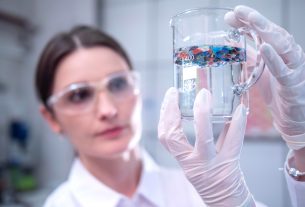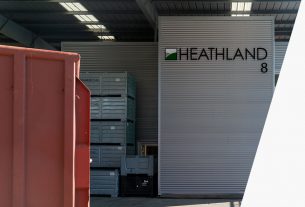EIES22 – Recycling high-quality engineering plastics requires a specific approach. According to Norbert Fraunholcz of startup Resolved Technologies, dissolving is the best option for most plastic types in this group of materials. During Dragons’ Den of Transition, the startup is looking for chain partners. And Fraunholcz immediately thinks a little bigger. He is also looking for partners to introduce the ‘dual carbon and circularity credit’.
There is a whole spectrum of techniques for turning waste plastics back into raw materials. The least invasive way is mechanical recycling. An excellent route if the plastics are sorted by polymer type. However, it does not offer a solution to extract dyes or other additives.
There are also more and more initiatives in the area of chemical recycling. With pyrolysis, for example, polymers are reduced back to the smallest chemical building blocks, after which they can feed naphtha crackers again. Depolymerisation does not go as far. This leaves larger building blocks, monomers. The advantage of these techniques is that dyes and other additives are removed. The disadvantages are that these processes cost a lot of energy and only a portion of the original plastic waste can be turned into new plastic again.
Physical route
However, there is another route: dissolving waste plastics. In this process, the plastics are dissolved in an organic solvent. Then the solution obtained is subjected to a series of purification steps to remove all types of contaminants – think dyes and flame retardants. Finally, the target polymer is recovered by removing the solvent and extruded into pellets.
This is still a physical route, argues Norbert Fraunholcz, CEO of startup Resolved Technologies. ‘We apply an additional step to mechanical recycling and in this way come close to virgin plastic quality. Another advantage is that we can make use of the infrastructure that has already been built up around mechanical recycling.’
At the moment, the Resolved technology is suitable for various plastics, especially engineering plastics. Think of ABS, polycarbonate, PMMA and soft PVC, which are widely used in electronics products and cars. The only sustainable way to reuse these high-quality plastics is closed-loop recycling. Where the recycled plastic is used again in its original application.
Chain partners
Resolved Technologies is currently preparing to build a pilot plant on the Brightlands Chemelot Campus. And the next step is the construction of a demo plant. For this, the company is looking for chain partners, for example, to try out the circular materials.
Dual credits
But Fraunholcz is thinking bigger. ‘The current system with carbon credits is now doing an excellent job. The CO2 price has risen very much in recent years. That has a positive effect on sustainability. However, it does not include the circularity component. To further encourage this, I propose a system with dual carbon and circularity credits. This will also encourage the reuse of materials. I am looking for partners who want to set up this system with us. And of course also parties who can offer and want to purchase these credits.’
Dragons’ Den of Transition
On November 30, DDoT will conclude European Industry and Energy Summit 2022, which is being held this year at Brightlands Chemelot Campus, in the Netherlands. It was organized for the first time last year. Click here for the report.





